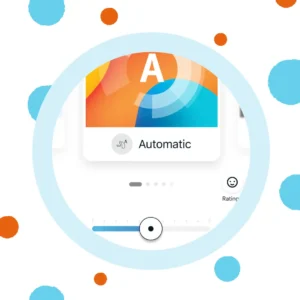
Sennheiser All Day Clear vs Starkey Evolv AI
The Sennheiser All Day Clear and Starkey Evolv AI serve different needs despite living in the same price neighborhood. One’s an over-the-counter option that works
Home » The Six Best Hearing Aids for Noisy Environments

Noisy environments are where hearing aids face their toughest test. From buzzing restaurants to crowded family dinners, background noise can turn even the best conversation into a garbled mess.
For people with hearing loss, these situations feel like trying to catch a whisper in a wind tunnel. Even the most basic chat becomes exhausting. Thankfully, hearing aid technology has come a long way.
Today’s hearing aids aren’t just amplifiers. They’re smart devices powered by artificial intelligence, noise-detecting sensors, and lightning-fast processors. They adapt, filter, and focus—cutting through chaos to deliver clearer speech.
This article dives into the six best hearing aids for noisy environments. We’ll also break down the brainy tech that makes them work.

Table of Contents
TogglePicture this: you’re in a lively restaurant. Laughter rings out from the next table. The server is listing five specials. A blender whirs behind the bar. And someone, somewhere, is dropping silverware like it’s a percussion solo.
For someone with hearing loss, this isn’t just mildly annoying—it’s an overwhelming sound stew. Your brain is trying to sift out speech from a cacophony of competing noise. But damaged hearing makes it tough to filter and prioritize sound. The result? Voices blur into the background.
Even with hearing aids, this setting remains a challenge. That’s because hearing aids can’t magically silence chaos. They need sophisticated tech to identify, enhance, and clarify what matters: human speech.
And let’s not forget listening fatigue. Straining to hear over background noise drains energy fast. After a night out, you’re not just socially exhausted—you feel like you’ve run an audio marathon.
In short, noisy environments hijack your brain’s ability to focus on speech. That’s where today’s advanced hearing aids come to the rescue.
Hearing aids for noisy environments aren’t just louder. They’re smarter. And they use a toolbox of advanced features to transform chaos into clarity.
Here’s a breakdown of the magic under the hood:
Modern hearing aids come with multiple microphones. These work together to focus on sound from one direction—usually the person in front of you.
Why it matters: It improves the signal-to-noise ratio. That means speech stands out and background noise fades.
DNR isn’t just a fancy filter—it’s real-time sound analysis. These algorithms scan the soundscape, detect repetitive noises (like air conditioning or crowd chatter), and tone them down.
There are several flavors:
Why it matters: You won’t hear in a vacuum, but annoying background sounds won’t steal the show.

Speech has rhythm, variation, and pitch changes. Hearing aids use algorithms to detect these patterns and amplify them selectively.
Why it matters: You get more of the words you want and less of the junk you don’t.
AI-trained hearing aids process real-world sound samples—millions of them. They learn what’s speech, what’s noise, and how to respond.
Why it matters: Instead of just reacting, the hearing aid predicts how to enhance your hearing.
High-end hearing aids constantly analyze the world around you:
Signia’s RealTime Conversation Enhancement is a prime example.
Why it matters: You stay focused on life, not on fiddling with settings.
Some hearing aids know when you’re walking, running, or sitting still.
Phonak’s Motion Sensor Hearing leads the charge here.
Why it matters: Your hearing aid adjusts to your activity, not just your environment.
Beamforming is great, but you still need to hear your surroundings. Advanced spatial processing lets you:
ReSound’s M&RIE and Oticon’s BrainHearing tech help create this experience.
Why it matters: You get focused hearing and environmental awareness.
Bottom line: The best hearing aids for noisy environments don’t just make things louder. They make them clearer, smarter, and more comfortable.
Let’s see which devices bring these features to life.
Perfect for people who want the sharpest speech clarity in even the loudest settings.
Discover how easy it is to buy Phonak Sphere Infinio hearing aids at home.
Best for folks who want smart automation and hands-free operation.
Ideal for tech lovers who want the latest and smallest AI hearing aid.
Oticon gives you an open, natural sound with smart adaptive support.
Smart choice if you’re always on the go and love group chats.
Best value for high-quality noise performance without top-tier pricing.
| Model | AI/Processor Tech | Directional Microphones | Speech Enhancement | Noise Reduction | Special Features |
| Phonak Audéo Sphere Infinio | DEEPSONIC AI Neural Network | StereoZoom 2.0, SpeechSensor | Yes – SmartSpeech™ Technology | Dynamic Noise Cancellation | AutoSense OS 6.0, Award-winning noise clarity |
| Starkey Edge AI | G2 Neuro Processor with Neural Engine | Adaptive Directionality, Edge Mode+ | Yes – On-demand boost up to 13 dB | Edge Mode+ real-time filtering | Up to 80M adjustments/hr, hands-free automatic optimization |
| ReSound Vivia | Dual-Chip AI with Deep Neural Network | Intelligent Focus, Ultra Focus Mode | Yes – AI-Powered Speech Focus | Multi-layer AI noise reduction | Auracast™ streaming, Bluetooth LE Audio |
| Oticon Intent | DNN 2.0 with 4D Sensor Tech | Adaptive Directional Mics via movement + conversation | Yes – BrainHearing™ Processing | SuddenSound & Wind Stabilization | Adapts to listening intent based on body/head movement |
| Signia Pure Charge&Go 7IX | Dual Processor (Separate Speech & Noise) | RealTime Conversation Enhancement, Augmented Focus™ | Yes – Real-time adaptation to multiple speakers | Dual-path noise filtering | Great for group conversations and mobility |
| Phonak Audéo Lumity | Single processor (AutoSense OS 5.0) | StereoZoom 2.0, SpeechSensor | Yes – SmartSpeech™ with directionality | Dynamic Noise Reduction | Strong background noise performance at a mid-tier pr |

It depends on what YOU want:
All of these feature advanced directional microphones, speech-focused AI, and real-time adaptation. But none of them will work perfectly right out of the box without proper fitting.
Even the best hearing aids need fine-tuning.
Contact Injoy Hearing to find the best hearing aid for noisy environments. We’ll match your needs with top-tier tech and walk you through the entire process.

The Sennheiser All Day Clear and Starkey Evolv AI serve different needs despite living in the same price neighborhood. One’s an over-the-counter option that works

Choosing between two award-winning hearing aids feels impossible when both promise crystal-clear sound. The Starkey Omega AI and Phonak Audeo Sphere Infinio Ultra represent the

Choosing the right hearing aid can enhance communication and confidence. Explore key factors like lifestyle, features, and budget to find your perfect fit.

Your hearing aids came with an app. You downloaded it. Now what? Modern hearing aid apps do more than adjust volume. They let you fine-tune
To start your journey towards better hearing with confidence, Injoy is proud to offer a 45-day risk-free hearing aid trial. This allows you to experience the difference our hearing aids can make, ensuring they meet your expectations and fit your lifestyle perfectly.
Improve your hearing and improve your life today by contacting Injoy to learn more! Call (844) 914-3331

Need hearing aids? Explore our range of hearing aids and discover the best option for your lifestyle and Unique Hearing Needs.
Are you a current patient with us? We're here to help with any adjustments, repairs, or support you may need.